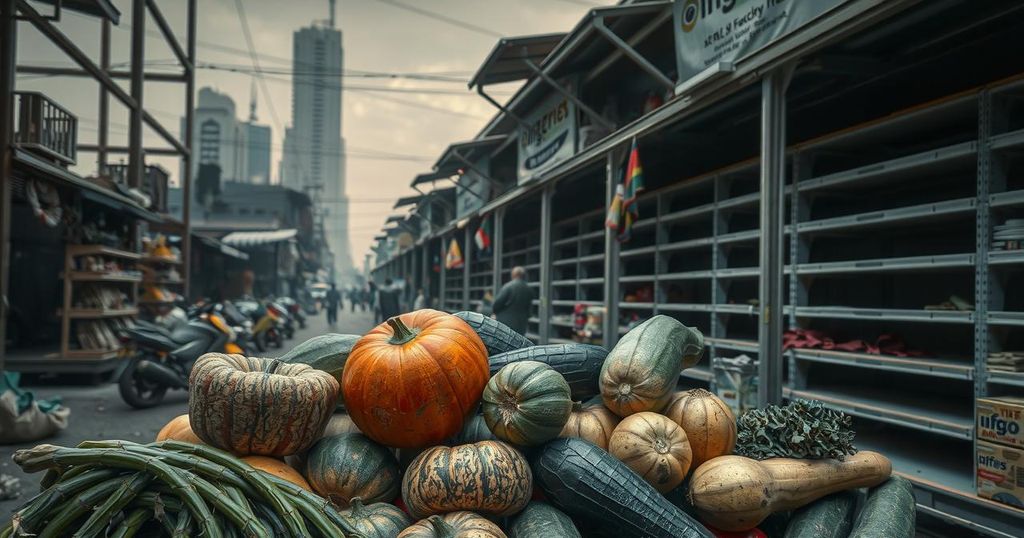Following the M23 takeover in Goma, food prices have skyrocketed by 18 to 160 percent, making essential items unaffordable for many. As conflict blocks aid, hundreds of thousands risk severe hunger. ActionAid and residents report ongoing challenges, with rising costs forcing families into malnutrition and limiting access to basic nutrition.
Food prices in Goma, a city in eastern Democratic Republic of the Congo (DRC), have experienced alarming increases following the capture of the city by M23 rebels. Local residents and the NGO ActionAid report that prices for essential items have more than doubled, with hikes between 18 to 160 percent observed over the past week. Basic nutrition is becoming unaffordable for many, pushing hundreds of thousands towards severe hunger amid escalating conflict and supply shortages.
Violence and disruption in Goma have impeded the flow of food and humanitarian aid from surrounding regions, which typically supply over 90 percent of the city’s necessities. Reports indicate that road access has been severely restricted as a result of the ongoing conflict, exacerbating food shortages and inflating prices significantly. This combination of factors has placed immense strain on the local economy, making basic food items unattainable for most families.
One local resident, Julienne Anifa, expressed her frustration regarding the situation, stating that the rising prices of essential products have dire implications for her family and the community. An ActionAid community volunteer further illustrated the plight by revealing that a bucket of rice now costs approximately $23, up from $20. While prices have eased slightly since the peak of the conflict, they remain prohibitively high for the average local household.
The humanitarian crisis is worsening, as many families are forced to forgo meals entirely due to the cost of food. ActionAid asserts that this dire situation is contributing to an increased risk of malnutrition, particularly among vulnerable populations such as women and children. As families struggle financially, many are now living on less than $2 a day, drastically reducing their food intake and overall nutrition.
Before this latest escalation, approximately 25 percent of the DRC’s population already faced food insecurity at crisis levels. The World Food Programme estimates that in the upcoming months, millions of children and women could face acute malnutrition as access to food continues to dwindle. Aid efforts have also been severely hampered since the violence erupted, leaving tens of thousands of displaced individuals without essential support.
In response to the urgent humanitarian needs, ActionAid’s DRC country director has called for all conflict parties to facilitate safe access for aid organizations to deliver much-needed supplies to the affected regions. Although M23 has recently declared a ceasefire for humanitarian reasons, the underlying challenges continue to threaten the well-being of Goma’s residents and hinder recovery efforts.
The humanitarian crisis in Goma, DRC, has intensified following the takeover by M23 rebels, triggering extreme fluctuations in food prices and access. Prior to this escalation, the DRC was already facing high levels of food insecurity, with a significant portion of the population reliant on external assistance. The conflict has compounded existing vulnerabilities, particularly affecting local families and displaced individuals reliant on consistent humanitarian aid.
In summary, the conflict in Goma has led to a drastic increase in food prices, making basic nutrition unattainable for many residents. Aid access remains limited due to ongoing violence, heightening the risk of malnutrition among vulnerable groups. Urgent measures are needed to facilitate humanitarian efforts and prevent further deterioration of the situation in Goma.
Original Source: www.aljazeera.com






